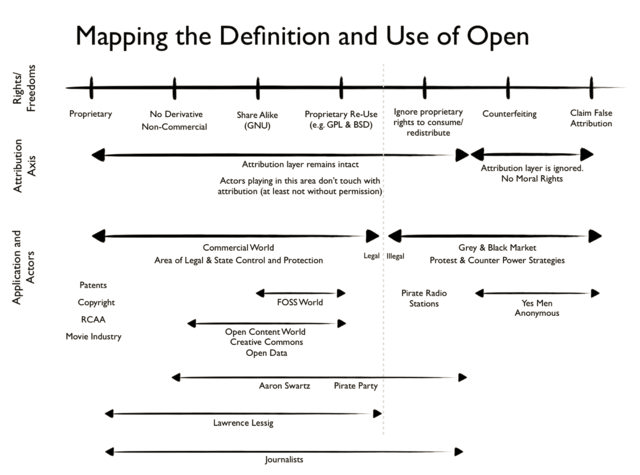Extending The Spectrum Of Openness To Include The Moral Right To Share
from the now-there's-a-thought dept.
Glyn Moody of Techdirt covers Sunil's David Eaves interview.
Prefixing concepts with the epithet "open" has become something of a fashion over the last decade. Beginning with open source, we've had open content, open access, open data, open science, and open government to name but a few. Indeed, things have got to the point where "openwashing" -- the abuse of the term in order to jump on the openness bandwagon -- is a real problem. But a great post by David Eaves points out that the spectrum of openness actually extends well beyond the variants typically encountered in the West:
While sharing and copying technologies are disrupting some of the ways we understanding "content," when you visit a non-Western country like India, the spectrum of choices become broader. There is less timidity wrestling with questions like: should poor farmers pay inflated prices for patented genetically-engineered seeds? How long should patents be given for life-saving medicines that cost more than many make in a year? Should Indian universities spend millions on academic journals and articles? In the United States or other rich countries we may weigh both sides of these questions -- the rights of the owner vs. the moral rights of the user -- but there's no question people elsewhere, such as in India, weigh them different given the questions of life and death or of poverty and development.
Consequently, conversations about open knowledge outside the supposedly settled lands of the "rich" often stretch beyond permission-based "fair use" and "creative commons" approaches. There is a desire to explore potential moral rights to use "content" in addition to just property rights that may be granted under statutes.
He then goes on to write about the ideas of Sunil Abraham, founder and executive director of the Centre for Internet & Society (CIS) in India. Abraham has created an interesting representation showing the extended gamut of openness, which reaches from proprietary to counterfeiting and false attribution:
|
|
|---|
Eaves's post examines some of the details of Abraham's map:
Particularly interesting is Sunil's decision to include non-legal "permissions" such as ignoring the property holders rights in his spectrum of openness. He sees this as the position of the Pirate Party, which he suggests advocates that people should have the right to do what they want with intellectual property even if they don't have permission, with the exception, interestingly, of ignoring attribution.
This is something that several Techdirt posts have touched on before. One of the most telling facts about unauthorized sharing online is that people preserve attribution -- there's no attempt to hide who made the song or film. That's probably why survey after survey shows that sharing materials online increases their sales -- something that would be unlikely if attribution were stripped from files. Eaves notes that this aspect ties into a particularly hot topic at the moment -- surveillance:
To Sunil, the big dividing line is less about legal vs. illegal but around this issue of attribution. "This is the most exciting area because this (the non-attribution area) is where you escape surveillance," he declares.
"All the modern day regulation over IP is trying to pin an individual against their actions and then trying to attach responsibility so as to prosecute them," Sunil says. "All that is circumvented when you play with the attribution layer."
This matters a great deal for individuals and organizations trying to create counter power -- particularly against the state or large corporate interests. In this regard Sunil is actually linking the tools (or permissions) along the open spectrum to civil disobedience.
It's a fascinating piece that brings some fresh ideas to an area that has been steadily gaining in importance for some time. I hope that Abraham builds on these thoughts, and publishes some more extended and worked-out explorations of them -- ultimately, perhaps, as a book.


